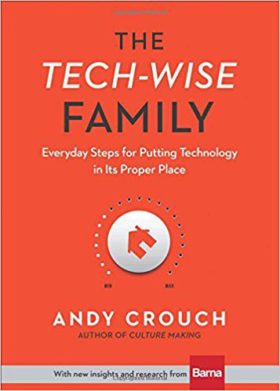 Crouch offers “Ten Tech-Wise Commitments” for families to consider implementing. The underlying philosophy is interestingly Richard Thaler and Cass Sunstein’s theory of “nudge” as written about in their 2008 book, Nudge: Improving Decisions About Health, Wealth, and Happiness. Crouch takes to heart their theories of behavioral economics and combines it with the traditional Christian teaching on the importance of discipline. As Crouch says in his Introduction, “If we want a better life, for ourselves and for our families, we will have to choose it—and the best way to choose it is to nudge and discipline ourselves toward the kind of life we most deeply want.”
Crouch offers “Ten Tech-Wise Commitments” for families to consider implementing. The underlying philosophy is interestingly Richard Thaler and Cass Sunstein’s theory of “nudge” as written about in their 2008 book, Nudge: Improving Decisions About Health, Wealth, and Happiness. Crouch takes to heart their theories of behavioral economics and combines it with the traditional Christian teaching on the importance of discipline. As Crouch says in his Introduction, “If we want a better life, for ourselves and for our families, we will have to choose it—and the best way to choose it is to nudge and discipline ourselves toward the kind of life we most deeply want.”
This book suffers from the same symptoms many other books about technology also suffer: what is meant by the word “technology.” It seems Crouch essentially means anything that makes “easy everywhere” and not just a tool that our grandparents might have used. The aspect of ubiquity and replacement of hard work are core to Crouch’s definition. This definition, though, suffers from the aspect that it is entirely subjective. One generations easy everywhere will not be another’s. For instance, the transition from horses to automobiles or the transition from oral history to written. Different historical “Andy Crouchs” during these transitional periods could just have easily used this definition and written Tech-Wise Family works of their own, for their own historical time period. Crouch’s definition is not entirely lost though because American readers will basically get what he means: all this new stuff that is permeating our work places and homes; the screens constantly connected to us and to each other.
The Tech-Wise Family suffers a second weakness in cautionary books about technology–that of the torn-purpose. In the first chapter, Crouch writes, “For technology, with all its gifts, poses one of the greatest threats ever conceived by human society to the formation of wise, courageous persons that real family and community are all about.” And then in the new section immediately following, “Please understand: I’m not saying technology isThis is not an easily solved problem as evidenced by the fact that good thinkers like Crouch get caught up in the confusion. The world still awaits a thoroughly consistent vision for how Christians should approach technological advances with both a cautionary and optimistic vision. Crouch offers a pretty good framework that “…technology is only very good if it can help us become the persons we were meant to be.” Families as places to build “wisdom and courage” throughout time have always been challenged by external and internal factors. The family dynamics recorded in the Bible were not exacerbated by 21st technology but seemed to still suffer many of the same sins and brokenness.
In summary, Crouch’s book offers a fine attempt at offering a Christian framework for technological engagement and a list of practices that are laudable and mostly beneficial. Despite its fundamental weaknesses and subjective slant, this book will do more help than harm.






